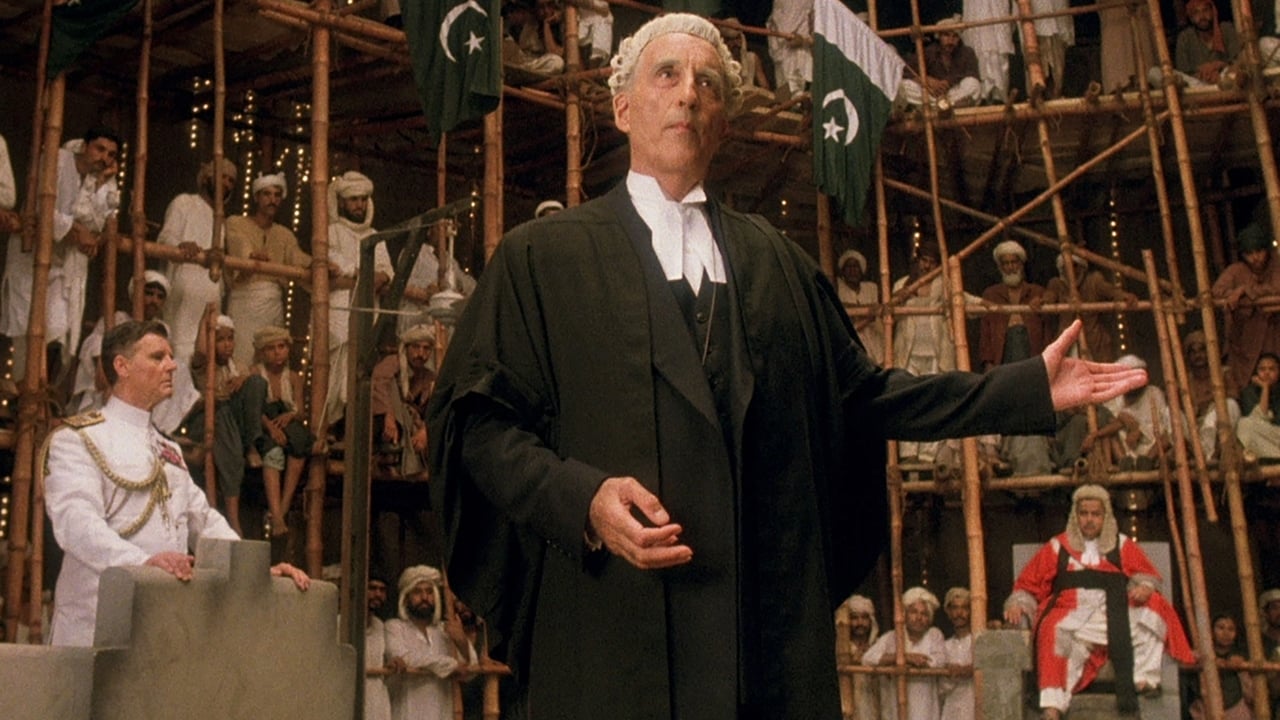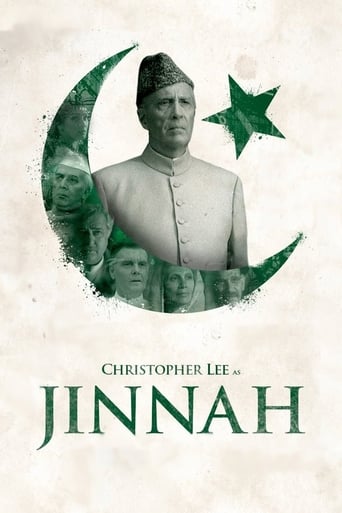



Thanks for the memories!
An action-packed slog
One of those movie experiences that is so good it makes you realize you've been grading everything else on a curve.
View MoreThere's a more than satisfactory amount of boom-boom in the movie's trim running time.
View MoreJinnah, directed by Jamil Dehlavi, is a 1998 controversial biopic about the founder of Pakistan, Muhammad Ali Jinnah. Renowned Islamic scholar Akbar Salahuddin Ahmed wrote the movie's screenplay. Jinnah stars the legendary English actor Sir Christopher Lee in the titular role. The movie costars Shashi Kapoor, Richard Lintern, James Fox, Indira Verma, Maria Aitken, and Talat Hussain. Dehlavi, a London-based filmmaker of Pakistani-French origin, is best known for The Blood of Hussain (1980)—a highly contentious, critically acclaimed film banned by the Pakistani military dictator at the time, Muhammad Zia-ul-Haq, as he believed the movie purposefully took digs at his tyrannical regime. Dehlavi effectively got relegated to the status of a persona non grata in Pakistan. Dejected and heartbroken, he later moved to the UK in want of creative freedom. Unfortunately, Dehlavi's controversial past would come back to haunt him two decades later during the filming of Jinnah.Dehlavi's contentious choice of making a western Christian—that too someone whose most famous portrayal hitherto had been that of Count Dracula—to portray the part of Muhammad Ali Jinnah didn't go well with the extremist elements in Pakistan. The government of Pakistan withdrew its funding halfway through the film. Christopher Lee received death threats and the activists demanded for his arrest and deportation; Lee had to be surrounded by armed bodyguards throughout the shoot. As a result, Jinnah was never really afforded a proper theatrical release in Pakistan. Christopher Lee considers Jinnah to be the greatest achievement of his long and illustrious career.The cinematic importance of Dehlavi's film can be easily gauged by the fact that till date it has been cinema's first and only major attempt at capturing in essence the philosophies and principles that underlined Muhammad Ali Jinnah's life. Before examining the movie further, it's essential to first try and demystify the enigma that was its subject: Muhammad Ali Jinnah. And, in order to fully grasp that, one needs to take the cognizance of the stature that Mr. Jinnah enjoyed at the time of independence. In many ways, he was Mohandas Karamchand Gandhi's arch nemesis, if ever there is one. In fact, it wouldn't be a hyperbole that, at the time, among Mr. Gandhi, Mr. Jinnah and Lord Mountbatten the future of India hung in the balance.The official announcement of the Partition of India, as per the Mountbatten Plan, triggered a chaos on both sides of the newly established border as massive population exchanges started occurring between the two newly formed states in the months that immediately followed. The end result was a massacre of humongous proportions that claimed hundreds of thousands of innocent lives (mostly Hindus, Muslims, and Sikhs) on both sides of the border. Jinnah being the grand architect behind the partition of British India into two separate states based on religion, a Hindu state and a Muslim state, was hailed as a hero in the newly formed state of Pakistan. But, in India, he was dubbed as a villain, was held responsible for the deaths of hundreds of thousands of innocent people. More than six decades have past but very little has changed. Mr. Jinnah continues to remain one of the most enigmatic, controversial and misunderstood figures in History.The treatment that Dehlavi gives his movie is no less interesting than his subject. He chooses to present Mr. Jinnah's tale in form of flashbacks. The opening scene of the movie shows a terminally ill Mr. Jinnah, accompanied by his sister and confidante Fatima Jinnah, being taken in an ambulance to some hospital. The next scene cuts to an anteroom situated somewhere between Heaven and Hell where Mr. Jinnah is greeted by a friendly, humanoid Angel (played by Shashi Kapoor) who has an hour and a half to prepare Mr. Jinnah's case, the outcome of which would decide his fate. Will he be convicted or absolved? Will he go to Hell or Heaven? As Mr. Jinnah defends the accusations made against him, the audience is treated to sumptuous vignettes from different junctures in History as the story follows important events in Mr. Jinnah's life (not necessary in a linear fashion): be it his early days as a love- struck lawyer who dotes on a beautiful Parsi girl named Ruttie (whom he eventually married); his later days as the greatest adversary of Mahatma Gandhi; or his brief stint as the 1st Governor General of Pakistan before finally succumbing to tuberculosis. Overall, Jinnah proves to be an important work of cinema that presents the caricature of a highly misunderstood man whose turbulent but celebrated life made his name a synonym for controversy. Jinnah had the courage to do what he felt was right for the greater good of his people. Although the movie is far from being flawless, it works well on the whole. The historical accuracy is undeniably questionable. The movie might upset those who lack forbearance. While the movie scandalizes Lord Mountbatten for being biased towards India, it takes a rather playful swipe at Mr. Nehru and Lady Mountbatten. Christopher Lee plays the part of older Jinnah with scalpel-like precision, Richard Lintern deserves a special mention for his arresting portrayal of the young Jinnah. James Fox (who plays Lord Mountbatten) and Maria Aitken (who plays Lady Mountbatten) are nothing short of being brilliant. Shashi Kapoor is charming to watch in the role of an Angel. These major performances are well backed up by the movie's support cast. But, Jinnah is not a movie for everyone.Only those with open minds should watch it, for it's bound to hurt the sentiments of those who lack tolerance and empathy. 9/10A more in-depth review can be read at:http://www.apotpourriofvestiges.com/
View MoreI am not a regular reviewer hence no earlier reviews from me on IMDb but this movie made me to log in and write. Only few lines i can say...Though, it covers only a very little part of Mr Muhammad Ali Jinnah... but clearly brings the character under the light for the world to see the greatness of the leader. I do believe that Jinnah is a leader who is not given the coverage that he deserved but this movie is a REMARKABLE EFFORT.... I don't blame the direction as this story really is too big to be covered in a given time of a movie... so i would give 10 out of 10 for the movie... At least it present the facts on a better scale.
View Morethis movie was awarded a SILVER REMI AWARD at the 1999 WORLDFEST in Texas,USA.lee clearly stands out from the crowd in his style of dialogue delivery and acting,James fox looks good as Mountbatten so does Shashi Kapoor as narrator,some scenes in this movie are worth watching especially the last one,Richard Lintern also does not let down with his performance as young Jinnah,the background score is OK,and so is the screenplay,the director has really and honestly depicted the life history of a forgotten leader,the movie is totally unbiased in its format and tries to look into the life of a great leader,all in all a must watch for anyone interested in historical biographies.one of the best biographical movies i have ever seen
View MoreThis is a high-quality biopic on the life of Jinnah, and an excellent film in general. It is a great character portrayal of a key figure in the history of the Indian subcontinent, and it peels away layers of Jinnah's life in the context of the events that shaped the independence struggle and the partition into India and Pakistan. The pace of the movie is unhurried and yet engaging; all the key actors have done a superb job of portraying their characters well and lent them credibility and depth. Lee, Fox, Kapoor, and Lintern were especially notable.Being from India, I especially appreciated the opportunity to learn more about the life and persona of Mohammed Ali Jinnah, who no doubt was among the most important historic figures of the time that shaped the history of the two countries. I liked the form of the film where Jinnah is challenged and questioned on many of the events in his personal life and on his political ideology. I feel that the film does an honest job of addressing and delving into those issues from his perspective and taking the viewer on an intimate journey into his motivations.The partition is a sensitive, politically charged, and often divisive issue for the people of India and Pakistan; the scars on either side are deep and not too distant. However, films like Jinnah and also Gandhi to some extent offer a critical glimpse into the human aspects of the leaders of those times and what made them Quaid-e-Azam or Mahatma for the people then and also for the generations that followed.
View More